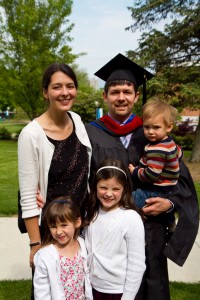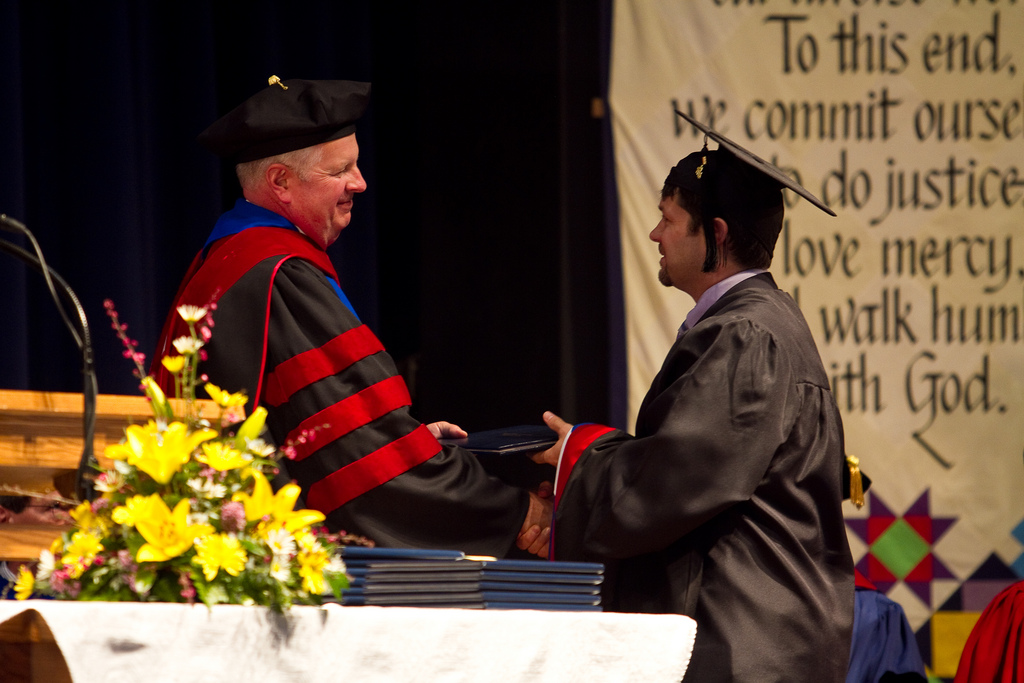As a Mennonite, one of the last “take-aways” Aaron Kauffman expected from Eastern Mennonite Seminary was learning about Christian traditions far beyond the Mennonite church and coming to appreciate them.
“When I was considering seminary I wasn’t really looking for another Mennonite experience,” said Aaron Kauffman, who received his MDiv degree this past weekend from Eastern Mennonite Seminary. “I grew up in Lancaster county, attended a Mennonite middle school and high school and then came to Eastern Mennonite University for college.”
New appreciation for other denominations
“But my pastor encouraged me to consider an Anabaptist theological education,” he continued. “And I have been surprised by the exposure to, and appreciation for, the wide range of Christian traditions that I have gained at EMS.”
Kauffman’s graduating class included Mennonite, United Methodist, Brethren, Episcopalian, Baptist, and Lutheran students.
“I now see myself as a convinced Anabaptist and Mennonite with something to offer, and many things to learn, from the wider church,” he said.
Last year Kauffman began an assignment as Global Ministries Director at Virginia Mennonite Missions.
Learning to think theologically

“When I come up against a particular issue we’re trying to work out at Virginia Mennonite Missions I try to think of biblical texts that frame the situation and reflect on them in my decision-making processes.”
Kauffman also has a master of arts in TESL, teaching English as a second language, and bilingual education from Georgetown University in Washington DC. He has taught English to high school students who were new immigrants and non-native speakers in the Rockingham County Public Schools, and has worked as the curriculum coordinator for the Intensive English Program at Eastern Mennonite University. Like many of his fellow seminary students, Kauffman is married and has children.
On April 28, Kauffman joined 14 others in receiving master’s degrees from EMS. Eleven, including Kauffman, received master of divinity degrees, one received a master of arts in religion degree and three received master of arts in church leadership degrees. In addition six students received certificates in ministry studies and two received graduate certificates in theology for peacebuilding.
Embracing the power of God
As the commencement speaker, Rev. Dr Daniel Garrett, an adjunct professor who teaches United Methodist studies, urged graduates to locate themselves in “the power and wisdom of God” and to embrace “a holy calling in what the world still sees as weakness and foolishness.”
Garrett traced his own journey as a minister to familial influences. His grandfather challenged him “to try to put everything that I was about to learn into the service of that truth [of the Gospel],” said Garrett.
Then he spoke of how his father tried to incorporate the newest technology of the time, a cassette tape player, into his ministry practice, upon the advice of his son.
Technology does not make ministry
“My father, in the 30th year of ordained ministry, already a wonderful preacher, got a tape recorder, put it on the pulpit one Sunday and recorded his sermon.”
After dinner that night, his father tried to listen to the tape, but a few minutes later fell fast asleep. Garrett joked that his father may have been the first preacher to be put to sleep by his own sermon.
“Who can predict what technologies will make ministry possible in new ways in the future?,” said Garrett. “I would suggest that you will need some guiding focus for what the church is about – to keep those technologies instrumental to the church’s purposes.”
The graduating class chose the theme “Fools for the Gospel” to guide the commencement weekend, basing the baccalaureate and commencement services in Jeremiah 9:23-24a and 1 Corinthians 1:18. Photos of seminary baccalaureate and commencement are available online.
